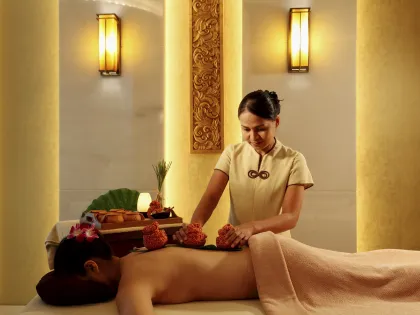Visitors to Asia will often have the opportunity to indulge in a massage, and two popular styles that are frequently offered are Thai massage and Ayurvedic massage. If you are not sure exactly what each involves, and thus which kind you might prefer, read on to find out more.
Ayurvedic Massage
Ayurvedic massage originated in India, but is provided today in many destinations across Asia. If you are visiting Centara Ceysands Resort & Spa in Sri Lanka, for example, you will have access to local expertise in Ayurvedic massage at the Cenvaree Spa. The name itself hints at the underlying concept, with 'ayu' meaning life, and 'veda' referring to knowledge. It can thus be described as the science of life. The massage technique uses pressure points to focus on balancing the mind, body, and spirit.
Ayurvedic massage is much more than 'just' a massage, however, as it is based on the notion that there are three doshas which make up the mental, physical, and emotional self -- and these doshas must exist harmoniously because ill-effects will materialize if they do not. Individuals will vary in terms of which of the doshas might be dominant, and therefore it falls upon the massage therapist to first of all determine exactly how to perform the massage to achieve the right outcomes and state of balance.
The Process
The process will involve the use of essential oils, infused with herbs, which are carefully selected in accordance with the particular imbalance the therapist wishes to address. These oils are then heated, and applied liberally to the skin so that they can soak into the pores, bringing about benefits to the nervous system and immune system. Meanwhile, the massage itself can be carried out using fast or slow movement flows as the therapist kneads and squeezes the body, with the aim of clearing the body's energy channels and also improving circulation.
Ayurvedic massage can be very relaxing, thanks to the oils, and the fact that the massage does not have to be performed with the firmness and vigour associated with some other techniques. While the best results would only come about if you can follow a full ayurvedic lifestyle, in particular focusing on diet, the treatment can improve the toning of body tissues, help to improve sleep patterns, reduce the effects of aging, and enhance the quality of your skin.
Ayurvedic massage, supported by its ancient belief system, can be an attractive alternative to western medicine, and appeals to people who are looking for something different in order to achieve emotional wellbeing through harmony of the mind and body.
Thai Massage
The experience you receive when choosing a Thai massage will be quite different to the Ayurvedic treatment. First of all, Thai massage does not involve oil, so you can remain fully clothed. Most spas will provide some loose-fitting clothing to wear, because your normal clothes probably won't allow the range of movement that your body is about to accomplish when manipulated by the therapist.
The Process
The massage will be performed on a mat, and involves a lot of stretching and pulling. Pressure is applied using the fingers, elbows, thumbs, and knees. During the course of the treatment you will be pulled into numerous unusual positions which serve to stretch and loosen the muscles. It is not designed to be relaxing, and if it is your first time you can forget the idea of dozing off while your therapist gently strokes and soothes your tired body. It is more likely that you will have to advise the therapist to go easy on you and use a little less force until you get used to the overall experience.
When the massage is over, however, you will certainly feel the benefits. Aches and pains can be significantly reduced and your range of movement will be enhanced. In contrast to other massage techniques that can promote relaxation of sleep, you may reach the end of your Thai massage feeling considerably energized. Studies have also shown that Thai massage is effective in relieving the symptoms of chronic tension headaches.
In summary, both Ayurvedic and Thai massage have been performed for over two thousand years, and form a significant element of the cultures of the countries where they were developed. The massage experience you receive will be quite different. If you are seeking relaxation and spiritual wellbeing, the Ayurvedic treatment may be more appropriate. If you are looking to relieve physical stress, Thai massage may be the more suitable approach. In either case, the professionals in your hotel spa will be able to explain more about the treatments they can offer, and will guide you in making the right choice.





Share-
-
-
-